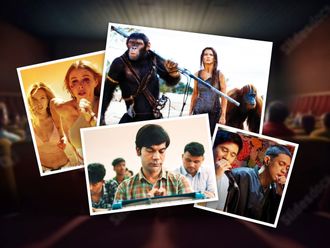Twenty minutes to tell a story. On film. In just one take. One night to make it happen. Israeli director Tomer Shushan, the writer and director of ‘White Eye’, faced these challenges and came out the other side with an Oscar nod.
He’s still a bit awestruck. “It’s very amazing feeling because I didn’t expect to be in this position and I was shocked for a few hours because I watched a lot of the movies that competed with mine and all of them were very, very good,” The Israeli director said.
The story itself, a commentary on the trials and tribulations faced by undocumented immigrants, came from a personal, uncomfortable experience. The movie follows a man who has located his stolen bicycle, only now it’s being claimed by someone else. “I was going to meet my mentor - my teacher from film school - and we were about to finalise another script that I was writing and we had most of the story and I found myself in this situation and I really didn’t like my actions or what I did there. Afterwards, when I met her I told her the story and she told me, ‘why don’t you write it as a short film?' And that’s what happened and I wrote it in one hour. The story has an important message for the world,” he says.
It’s a particularly poignant narrative at a time when populism is on the rise. The world is often divided into the us and them groups, and the ‘them’ – legal or illegal – are treated with hostility and ire.
It’s a subject that has fascinated Shushan. “I really, really want to talk and touch [upon] these topics about people from different layers of society that we meet in real life and realise that we are not so different, so why [does] the world make us separated and categorised by levels of where we come from?”
The discussion, he says, is important and interesting.
Shot in one take
But just because you have a story doesn’t necessarily mean you’ll be able to make it, especially in the way you want. For Shushan, the challenges were financial and that he wanted the whole sequence of events shot in one take. “We only had money to make it to one night and I really wanted it to be one take, so we had lots of rehearsals for 7-8 months and then we started to shoot the film and it took us some time to understand how to do it. Finally, we had seven takes and we chose one of the takes. It was very important for the story to get everything in one shot so people will be able to reflect the main character. To be on the same stage as him, to not have any moment to stop, like [the] camera don’t have.”
This needed mental edits. “I needed to edit it in my mind, to know what will happen and the meaning of the whole story,” he said.
From usual to unusual
It’s the little things that add drama to a story that centres on one incident; one night, few people; an ordinary time. “I knew that I need to give the audience the feel of how people can be affected by things that can seem normal. And I really want to put in front of the audience what it is to live like an illegal person that’s hiding from the authorities and all he wants is just to live and make a living and just help his family, and just survive. And it’s so hard for them. I really want to show how they go through life and how this should not be happening,” he adds.
But the end of the night one dialogue said quietly seems to scream past the movie credits: “Was it worth it?” Is the behavior we resort to when dealing with the ‘others’ really worth the inhumanity it will result in, in the mirror?
Shushan’s ‘White Eye’ has already won Best Short Film at the Haifa International Film Festival in 2019 and the Grand Jury Award at the SXSW Film Festival 2020. But he’s far from done. “I really want to express myself and my point of view of life with the power of cinema, which is in a world that I create. So I feel connected to the feelings my subjects have,” he explains.
Coming to the UAE?
“I am working on two feature films and one series ['Torso']. One of the feature films is the development of ‘White Eye.’ It’s kind of different story but the people are the same and somehow they connect and find help with each other,” he says. Tomer's upcoming feature film is called ‘Between The Sand Grains’.
Sushan is also hopeful of a visit to the UAE once pandemic travel restrictions have eased. “I hope I’ll have the chance to come [to UAE]. I hope my film screens there during Dubai Film Festival,” he says.
For now though there's the Oscars to think about; the gala is scheduled for April 26 in Los Angeles. Another night that may lead to a striking story.








